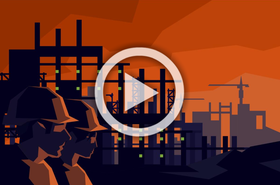In this age of exponential digital growth, the need for efficient and sustainable data centers has never been greater.
Our reliance on digital infrastructure is rapidly expanding, and with it, the demand for data centers that are designed not just with efficiency and cost-effectiveness in mind, but also with an emphasis on sustainability and community impact.
This has led to a shift in perspective, where modularization, sustainability, and efficiency are more than buzzwords; they are the essence of future-facing, responsible digital infrastructure development.
Below is a recap of the Fireside Chat between Patrick Quirk, CTO of Nautilus Data Technologies, and Stephen Worn, CTO of DataCenterDynamics.
Data centers as a product
In the modern digital age, the way we perceive data centers is undergoing a significant shift. Instead of viewing these centers as mere repositories for IT gear, there's growing momentum toward recognizing them as products.
This shift in perspective paves the way for continuous improvement and quality enhancements. The product-oriented approach lends itself to the methods of industrialization – assembly line production, standardization, and precise execution – promising lower costs and higher quality, with consistency in outcomes.
Modular infrastructure is a solution
The adoption of modular infrastructure is an effective solution to the mounting challenges faced by the data center industry.
This approach offers a remarkable speed of deployment, with a standardized yet customizable module that can be manufactured, ordered, and delivered to a data center site in months or even less.
This means site construction can proceed concurrently with other processes, eliminating the need for a linear, dependent transition. Notably, this is not providing a container, but a customizable, quick-deployment infrastructure solution tailored to the specific environment.
A recent study from the DCD>Building at Scale conference revealed that 39 percent of data center professionals reported project deployments in less than a year and 66 percent in under 18 months. This trend underscores the urgency for data center designers to opt for more scalable solutions to keep up with the fast-paced demand.
Modular data centers' efficiency is further enhanced by pre-testing and pre-assembling the entire data hall infrastructure, which allows for rigorous quality checks and assures equipment functionality before it arrives on site. This pre-emptive approach simplifies the commissioning process and provides a higher level of assurance on performance and quality.
The sustainability and efficiency factor
Sustainability and efficiency in data centers extend beyond the realms of power and water. A dense design means using less copper, less steel, less concrete, and less space, which ultimately leads to cost savings.
An efficient data center minimizes energy usage, reduces carbon footprint, and optimizes operational processes. The importance of efficiency is multi-faceted, and it manifests in various ways.
For example, the 'good neighbor' factor associated with a dense design is an often overlooked but essential benefit. In addition to the reduced sound of cooling towers, you will find that eco-friendly data centers are quieter in general and do not cause disruption or annoyance in surrounding communities.
Artificial intelligence and density
Artificial Intelligence (AI) and density are crucial aspects shaping the future of data centers. AI, alongside high-density liquid cooling, presents a sustainable and improved performance approach for data centers.
Rapid deployment times and competitive pricing make these models an appealing alternative to traditional facilities, while the rise of generative AI, like ChatGPT, will demand liquid cooling.
Achieving one million active users in record time, ChatGPT's power consumption is considerably higher than conventional applications, equating to 50-100 times the power of a single Google search.
This increased power demand necessitates cutting-edge solutions, leading many industry leaders to adopt a modular architecture approach that supports growth, density, and sustainability.
Continuous improvement and innovation
Continuous improvement and innovation form the backbone of the future-oriented data center industry. Listening to customer needs and learning from deployment experiences are vital for nurturing a culture of innovation.
As the journey towards perfecting data center operations continues, the industry looks forward to evolving and getting better than it is today. The future of data centers lies in embracing modernization, sustainability, and a modular integrated infrastructure approach.
If you're intrigued by our discussion on the future of data centers, modernization, sustainability, and the power of artificial intelligence, tune in for the entire conversation to take advantage of the comprehensive insights here.
More from Nautilus Data Technologies
-

Sponsored Dude, where’s my high density rack?
As densities continue to increase, it begs the question, where are all the high density racks?
-

Sponsored A rethink on efficiency: How deeper ideas help lead the charge
Industry efficiency is on us, let’s make it happen
-

Sponsored Driving data center success despite the headwinds
Five challenges facing the data center industry which we'll need to survive to thrive



